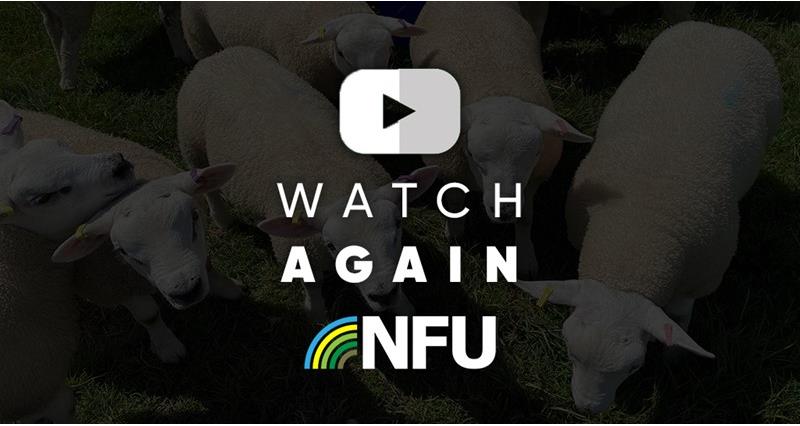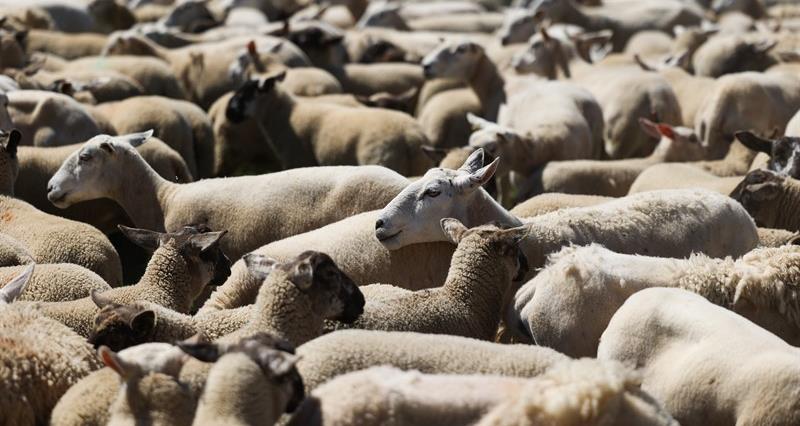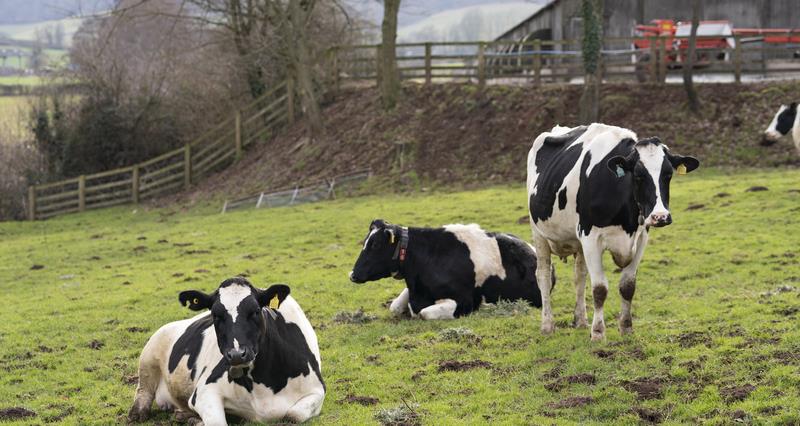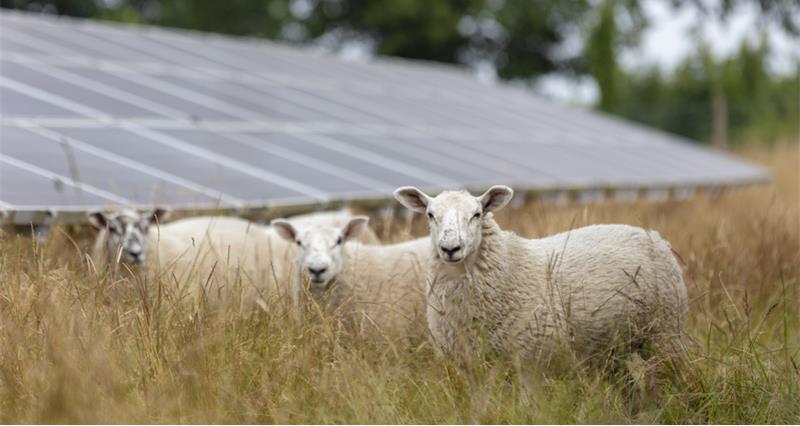As the status of bluetongue in Great Britain is continuously changing, and in preparation for any increase in warmer weather, we have put together a guide to aid farmers in preparing for bluetongue on farm.
Our guide is intended to be used alongside our essential information page which includes latest news and the current situation.
Remember:
B – beware when buying animals
T – take action if you spot the signs of bluetongue in your animals
V – always remain vigilant
Initial considerations
Could you cope with extended periods of time when your animals are separate from your main holding, or unable to move due to any restrictions in control zones?
Here are some initial points to consider:
- If your animals spend time away from your main holding, can they be looked after, or handled appropriately?
- Can you provide enough feed/water/shelter for an extended period?
- Will you come under pressure from a landowner to move the animals off at any point?
- Speak to your usual market or abattoir and make sure that they are fully aware of the risks of BTV restrictions – what contingency plans might they follow?
- Talk to your bank or financial adviser about any financial risks to your business in advance of any cashflow pressures which may result from BTV restrictions.
- Make sure your on-farm records and paperwork are up to date and accessible.
- Alert any staff or stock people to the clinical signs of BTV so that they know what to look out for.
Where bluetongue virus is circulating in the midge population, the CVO (Chief Veterinary Officer) is likely to put restriction zones in place. The movement of ruminants, camelids and germinal products (semen, embryos and ova) onto or off a bluetongue restricted premises will be prohibited, unless under licence issued by a VI (Veterinary Inspector) from the APHA (Animal and Plant Health Agency). This is known as a bluetongue specific licence, or EXD100.
You need to plan accordingly and apply for the licence at least five days in advance prior to the scheduled move. Be aware that in some circumstances, especially when moving animals to live (e.g. higher to lower risk zone if permissible) testing may be required, so factor that extra time and management resource in.
While Defra may agree to cover the cost of the laboratory testing, it may be down to the farmer to cover the cost of the Private Veterinary Surgeon (PVS) to collect the blood sample.
Movements to slaughter don’t require testing for BTV.
If your premises spans across different zones, in most circumstances the rules for the higher risk zone applies.
Applying for a licence
You can apply for a specific movement licence at: GOV.UK | Bluetongue: apply for a specific movement licence.
The current situation regarding movement licencing can be found in our essential guide to Bluetongue: Movement licencing | Bluetongue – the latest information
Licence considerations
The VI risk assessing your application will consider the location of the origin and destination, surveillance outcomes, health status of the animals and any welfare implications. Make sure they are all clearly stated on the application form. If the move is likely to be repeated, and there are multiple use licences available for it, you need to state that, too.
| To Control Zone (CZ) | To Protection Zone (PZ) | To Surveillance Zone (SZ) | To Free Area (FA) | |
|---|---|---|---|---|
| From CZ | Not allowed | Not allowed | Not allowed | Not allowed |
| From PZ | Not allowed | Allowed | Potentially allowed based on pre and post movement testing | Potentially allowed based on pre and post movement testing |
| From SZ | Not allowed | Allowed | Allowed | Potentially allowed based on pre and post movement testing |
| From FA | Not allowed | Allowed | Allowed | Allowed (transit through zones under licence) |
Types of movement
Farm to/from TLA (temporary land association) or tCPH (temporary county parish holding)
Make sure any additional land you are using is correctly registered with the RPA (Rural Payments Agency) and APHA. Incorrect registration can slow down processing licence applications.
Full guidance on applying for TLAs and tCPHs can be found at: GOV.UK | Get a temporary land association (TLA) or temporary county parish holding (tCPH) number
Farm to farm
Refer to the above table.
Commons
There is no particular licence to move animals on/off the common grazing land. The government will take into account the natural land features when declaring the restrictions zone, so it is very likely that any common land will be included within the specific restriction zone within which animals can move, unless subject to specific restrictions.
Sales through market
Markets may continue to operate within the zones. Animals will be able to move within the zone, however movement out of the restrictions zone will be subject to the licenses issued by APHA.
Slaughter
Abattoirs located outside the restriction zones that slaughter ruminants from the restriction zones must be designated. The abattoirs within the restriction zones don’t need designation.
Arrival and slaughtering times at the abattoirs may be different to the usual times, so it is important that you arrange and confirm it with the FBO (Food Business Operator). The arrival time in most cases, corresponding to hours of peak midge activity, is one hour after sunrise and no later than two hours before sunset.
A list of the designated abattoirs is updated regularly and can be found at: GOV.UK | Bluetongue: apply for a specific movement licence
TB reactors
If you have TB reactors, a 10 day reactor removal time applies and the abattoir must be designated for the BTV. APHA will arrange the required licences, slaughter of the reactors and compensation.
Livestock shows
Currently, no specific conditions have been set against livestock shows. We expect that livestock shows within a zone will be able to accept animals from that same zone, but movement restrictions will apply to animals coming from different zones.
When considering whether to take animals to shows, think about the implications of the move and risk status of the return journey to your farm. Remember that moves from high risk areas or zones to lower risk or free areas are unlikely to be approved. If they are approved the animals may require testing.
Using insecticides
In transport vehicles
Animals must be protected against attacks by the vectors during transportation to the destination.
Insecticides must be effective against flying insects, specifically midges (culicoides) and used according to the manufacturer’s instructions. Overuse can cause development of resistance in midge populations.
The active ingredients pyrethrin or synthetic pyrethroids are reported to be effective.
Insecticides must be authorised and approved for use as biocidal products in the UK by the HSE (Health and Safety Executive), either under:
- Control of Pesticides Regulations (HSE) approved biocidal products
- Biocidal Products Regulations (HSE) approved biocidal products
On animals
Synthetic pyrethroid (e.g. deltamethrin)-based pour-on insecticidal products are approved in the UK for use on cattle and sheep against some biting flies and lice. They have not been proven to have a direct impact on BTV transmission but may reduce the biting pressure on an animal, although this effect will be temporary (only a few days).
The use of the insecticides on animals must be noted within medicine records and the withdrawal periods for milk (if present) and meat observed. The withdrawals vary among the products but are, on average, within range of 35 days for sheep and 20-17 days for cattle.
Consult your PVS (Private Veterinary Surgeon) for advice. For a list of authorised products visit:
Breeding of livestock
The movement of germinal products from restricted zones to FA is not permitted.
Licenses allowing movements of germinal products within the zone and from FA to the zone are not currently available, but being considered by the government. They may include conditions such as pre and post semen collection testing.
The movement of livestock for breeding (e.g. bull hiring) is subject to licensing requirements described above.
Plan accordingly, especially if you usually rely on livestock movements. Consider sourcing breeding stock within the restriction zone or using AI (Artificial Insemination) when appropriate.
Consider taking semen from your own bulls or tups for home use early in the year when you can be confident that the animals have not been exposed to the bluetongue virus. The BTV virus can remain active in semen for a long time so there is an increased risk of onward infection from semen.
Biosecurity
Vector control can decrease the risk of establishing disease in the local midge population. The culicoides midges that carry the bluetongue virus usually breed on animal dung and moist soils, either bare or covered in short grass.
Plan in advance which biosecurity methods are practical for your holding and can be deployed. Plan ahead to buy supplies as those may be high in demand if an outbreak is declared.
Limit breeding sites for vectors. Ensure there is frequent, at least weekly, dung and manure removal. Spraying the manure with the insecticide has no impact on the midge population and may just create environmental contamination.
Dry up breeding areas by mending leaks and filling in or draining damp areas.
Disposal of afterbirth. Prevent your pets from eating, chewing on or playing with potentially infective material, such as aborted material or afterbirth, as there is evidence dogs and other carnivores may become infected.
TB testing – mechanical transmission of BTV via tuberculin intradermal (‘skin’) testing of cattle and other species is considered to be very rare and of no significance for the further secondary spread.
Additionally, OVs (Official Veterinarians) and ATT (Approved Tuberculin Testers) are required to ensure that tuberculin needles are wiped between the animals with cotton wool moistened with surgical spirit and any needles contaminated with blood or other material are changed.
It is anticipated that the statutory TB testing programme will continue as normal in the case of a bluetongue outbreak.
Sheep shearing – transmission of this virus within and between herds and flocks by contaminated equipment, clothing and unhygienic practices is very unlikely but cannot be totally excluded.
Shearers should ensure good biosecurity practices as a preventive measure to protect animals not only from BTV but other diseases that can be present in the flock, such as caseous lymphadenitis, orf, pink eye or foot rot.
For more advice on shearing, visit:
National Sheep Association | Practical considerations for best practice during shearing in the UK
Trade
Trade restrictions imposed by the importing authority, for movement of live ruminants and germinal products are in place until country/regional freedom from the disease is confirmed. It can take up to two years to demonstrate and declare country freedom.
The government may apply for the regionalisation or renegotiating of the opening of the trade market again, but it is possible that additional checks or testing will be needed. It will be reflected in the in the attestations contained within export health certificate.
Movements to Northern Ireland of susceptible livestock from GB are also stopped at present. Movements of germplasm are subject to appropriate restriction and your export certifying OV is best placed to provide advice on the export guarantees that must be met.
Meat, edible co-products and animal by products are not affected, although some individual countries may restrict skins and hides.
The latest information on availability of export health certificates for different commodities can be found at: GOV.UK | Get an export health certificate
Vaccination
At present there is no available vaccine for the existing BTV3 serotype. There are vaccines available for other serotypes but they don’t give cross-protection for the BTV3 serotype.
When the BTV3 vaccine is available and authorised for use by VMD (Veterinary Medicine Directorate) the government will carry out risk assessments. It may permit a voluntary vaccination or may make vaccination compulsory in a declared vaccination zone.
At the moment the cost and dosage of the vaccine is unknown but be prepared that booster vaccination may be required. In preparation for any future vaccination roll out, ensure you have appropriate holding and handling facilities.
The correct vaccine dosage is also very important to the development of post vaccination immunity.
The NFU will keep members updated about this online and through our regional and sector communication channels.
Surveillance
APHA may request to carry out a surveillance visit on your holding, which will include:
- Checking records (production records, milking records when applicable, fertility, mortality, medicine and movements)
- Inspection of susceptible animals and potentially taking blood sample (lambs under 12 weeks and calves under seven days only sampled when dam tests positive)
Please ensure you can fully assist Veterinary Inspector as that would enable them to facilitate lifting restrictions from your holding in the future.
Tracings
A tracing exercise is be carried out by APHA for susceptible stock that moved on and off the premises in the 60 days prior to the first identified infected case (unless epidemiological assessment prescribes a longer or shorter period).
The identified holdings are contacted and the Veterinary Inspector will carry out the visit and follow the same protocol as listed above under surveillance visit.
Suspicion and investigation
Bluetongue is a notifiable disease – if you suspect bluetongue you must report it. Details for reporting suspected cases can be found at: GOV.UK | Reporting suspected bluetongue
Further information on clinical signs can be found at: ruminanthw.org.uk | Bluetongue virus FAQs
The Veterinary Inspector who carries out the investigation will enquire about:
- all animals, by species, clinically affected, dead and clinically normal
- veterinary history of the herd, including medicine use
- movements of BTV-susceptible animals onto, and off, the suspect premises in the previous 60 days and contact premises
- possible midge breeding sites
- they will inspect the herd/flock and examine chosen animals
- they may require to take blood samples
Culling may be used in circumstances where the disease is not circulating in the midge population to prevent the wider spread outbreak. Once BTV is known to be circulating in the domestic midge population, culling of livestock is not an effective control measure.
If your animal/s were required to be culled to control bluetongue disease then you would receive compensation at market value for that animal (unless you had imported diseased animals in which case there would be no compensation).
There is no specific C&D protocol post culling, but you should consider any procedures to enable removal of the manure, bedding and any other material that is suitable vector habitat.
If animals display clinical signs of bluetongue but culling is not required, further treatment will be likely. Contact your PVS (Private Veterinary Surgeon) in this instance. There are no specific antiviral drugs available, and therapy includes nursing care and medicines to reduce clinical signs, though early euthanasia decisions need to be considered on animal welfare grounds.
Fallen stock removal
There are no restrictions on the movements of fallen stock to the knacker's yards or disposal sites.
More bluetongue content from NFUonline:

Watch again: Bluetongue update featuring the UK's Chief Veterinary Officer


